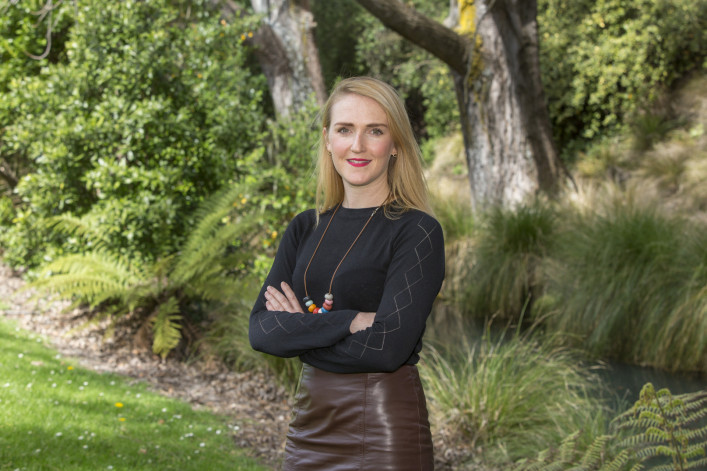Posted on 27 July 2021
Making law to protect the future of our ocean
- In the media
- Governance Policy Enabling ecosystem-based management Phase II (2019-2024) National
- 5 Minutes to read
This article is republished with permission from University of Canterbury. Read the original article.
Written by Aleisha Blake, Senior Communications Advisor | Kaitohutohu Matua, Pāpāho, UC
A future-focused research project co-led by University of Canterbury researcher Associate Professor Elizabeth Macpherson is considering what legal and policy options might exist to protect our oceans for generations to come.
The vision of the Sustainable Seas National Science Challenge is to ensure that Aotearoa New Zealand has healthy marine ecosystems that provide value for all New Zealanders. Associate Professor Macpherson’s project Policy and legislation for EBM, which she co-leads with Dr Steve Urlich from Lincoln University, will provide options for legal and policy reform to enable ecosystem-based management (EBM) in the marine environment. The interdisciplinary project brings together researchers from around Aotearoa with experience across law, policy, mātauranga Māori, ecology and social sciences, and includes University of Canterbury Law researcher Adrienne Paul.
The goal of the 3.5-year project is to provide options for government to improve how we manage and regulate our oceans, taking an interconnected ecosystem approach and ensuring the protection of Māori rights and interests in marine areas. Associate Professor Macpherson, of the University’s School of Law, says the project has a practical focus.

Associate Professor Elizabeth Macpherson, University of Canterbury
“An ecosystem approach recognises that the ocean is an interconnected system, and people are a part of that system. It doesn’t make sense for our laws to divide the ocean into separate legal frameworks for components of that system that don’t ‘talk to each other’ – like coastal areas and estuaries, fishing, mining, conservation, or transport. There are hundreds of laws and polices impacting on the ocean, from across many areas of policy and practice, which the research team is trying to reconcile.”
“Much of our time is spent engaging with our research partners and collaborators. There are many areas of policy and practice that we need to understand – the Resource Management Act, fisheries law, Māori rights and interests, biodiversity policy, climate change policy, coastal policy – and we have to be across all the new environmental policy proposals being released by the government.”
“This project is intended to support transformational change. The health of our oceans is deteriorating at a rapid rate. There is a real risk that if we don’t change something, New Zealanders won’t be able to use these marine environments in the way that we do today.”
The research team will produce several academic papers, but also end-user targeted research outputs, to communicate research findings in a way that makes practical sense to government, Māori organisations, iwi/hapū and industry.
Associate Professor Macpherson says the findings could lead to changes that affect every New Zealander.
“I do think there will be implications of oceans reform for everyone in Aotearoa New Zealand, which is why research co-development is so important in this project. We are doing our best to understand the environmental, social, cultural and economic perspectives of people with relationships and rights in marine and coastal areas.”
As someone who spends a lot of time in the outdoors, Associate Professor Macpherson wants to see healthy rivers, estuaries and oceans, and more resilient and relational management of the environment.
“I research environmental law and policy because I hope there can be some improvement in how we protect ecosystems and their biodiversity, for the benefit of future generations – we are seeing rapid deterioration in ecosystem health in Aotearoa New Zealand and this requires urgent action.”
The rights of Indigenous peoples are key to her research, and there is an increasing focus on the interests of young people and future generations around environmental concerns. There is growing awareness, she says, that the people who are inheriting environmental problems should play a leading role in developing environmental solutions. By improving processes in the various levels of local and national government and giving more decision-making power to Māori and local communities, money could be re-directed towards on-the-ground action by those people who know their local areas.
“I would like to see more government power transferred to Māori, iwi and hapū to have more control and authority over how the environment is managed. Also, a lot of the really interesting environmental law protections we are seeing around the world are being driven by young people.”
Some major environmental law cases from overseas have leveraged off the recognition and protection of environmental rights, including at constitutional level. But the New Zealand Bill of Rights Act doesn’t guarantee the right to a clean and healthy environment, and we don’t have an environmental rights culture in Aotearoa, something that Associate Professor Macpherson is considering in her broader research. She says, “it is often said that you don’t need to frame something as a right until it is at threat,” which raises the question of whether, in terms of the environment, we have now arrived at that point.
Where nature and knowledge collide, University of Canterbury researchers are building Sustainable Futures. Throughout July, we are sharing some of the innovative research University of Canterbury academics are creating to grow society’s understanding of the natural world and shape a sustainable future for generations to come. He Kaitiaki tatou katoa – We will enhance and nurture our resources.
See University of Canterbury research building towards a Sustainable Future.
For more information or media interviews contact:
Associate Professor Elizabeth Macpherson, University of Canterbury School of Law, [email protected] phone: 03 369 5459
Or
UC Communications team, [email protected] Phone: 03 369 3631 or 027 503 0168
Bonus content!
Elizabeth was also interviewed by 95bFM, University of Auckland's student radio, on the work she and Steve Urlich are doing as part of the Policy and legislation for EBM project, and the exciting times we are in for ocean policy reform in Aotearoa New Zealand.